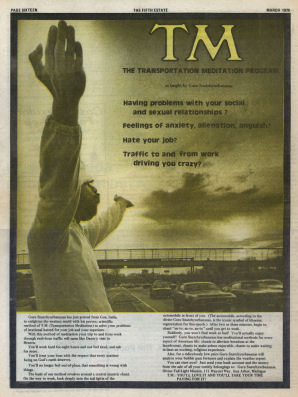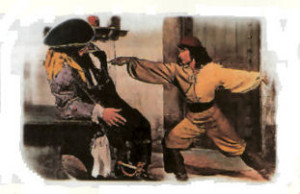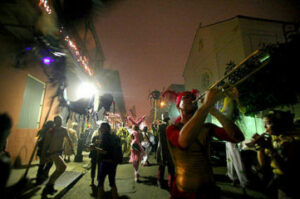Most Recent Additions
Dave Hanson
Shamanism, anarchy and the end of the world
After twenty years of teaching shamanic practices to small groups in several circles in Washington and California, I found the results to be mixed. In the groups in which I participated, there were many moving visionary experiences, but the flabby jargon of the human potential movement left important messages missed amid incessant psychobabble.
Aug 1, 2014 Read the whole text...
Joshua Sperber
Tarot Cards and The Left
How prognostications of doom encourage passivity rather than action
There is a near cottage industry of leftists penning engaging, sometimes lurid, always vivid, prognostications of impending social, political, economic, and ecological doom.

Websites like Counterpunch and Common Dreams, for instance, have been prophesying for several years that a war on Iran is imminent due to the fact that, alternately, a US destroyer moves to the region (2006), oil prices rise (2007), an admiral retires (2008), or, the ubiquitous favorite, the Bush Administration is simply insane. Each one of these omens indicates there will assuredly be war, maybe tomorrow.
Aug 1, 2014 Read the whole text...
Daniel Pinchbeck
The End of Money
The current economic crisis may be another bump on capitalism’s always dizzying terrain, or it may signal epochal changes
The crisis of the financial markets has taken on gargantuan proportions.
This spring saw the emergency sale of Bear Stearns, the fifth-largest financial institution on Wall Street, to JP Morgan for a paltry sum by “Master of the Universe” standards, including its flashy corporate headquarters and thousands of employees. Even this sale only came about because the US Federal Reserve agreed to cover the risks of exposure to creditors, pushing the financial costs onto US taxpayers. Despite this bailout and other interventions in the supposed “free market,” the financial system is still reeling. Credit liquidity has disappeared, causing shockwaves in student loans and other areas.
Aug 1, 2014 Read the whole text...
Walker Lane (Peter Werbe)
An Anarchist in Cuba
Socialism or Cell Phones
On February 2, I stepped off a plane that had left a frigid Toronto three and a half hours earlier and landed in the balmy sunshine of Holguin, Cuba. It was impossible to know then that I had arrived two weeks before the end of the island’s Revolution as we know it.

Jul 30, 2014 Read the whole text...
RNC Welcoming Committee
RNC: Shut It Down!
Welcoming the Republicans to the Twin Cities
The 2008 Republican National Convention (RNC) will descend on Minneapolis-St. Paul, September 1 through 4, as the opening act in the pacifying spectacle of the coming presidential election. The most direct way to oppose a dog-and-pony show is just to stop it.

This convention of the rich, the white, and the conservative, is a self-congratulatory event intended as the opening shot in the attempt to convince the hapless voter that John McSame represents patriotism, experience, and “our” values, rather than war, empire, economic royalism, and the rest of the miserabilism known as America. Stopping the convention won’t stop the election, but it will disrupt their spectacle and prove that we have the power to shape our own communities and future.
Jul 29, 2014 Read the whole text...
Fifth Estate Collective
Editorial
Money: Root of all Evil
As several people who have seen this issue prior to publication have noted, the correct quote is “The love of money is the root of all evil,” but its truncated form seems more accurate than the original. Money itself, not just cherishing it, is the ultimate representation of all that is alienated in the modern world; the driving force of pathological greed; the whip that coerces wage labor; and the basis of wars. The current inequitable split of the planet’s wealth now allows ten million millionaires world-wide to control $37.2 trillion dollars in financial assets assuring a life of immiseration for billions of people.
Jul 28, 2014 Read the whole text...
H. Read
Green Scare Continues
More arrests and harsh sentences for planet defenders. Fifth Estate writer indicted!

Developments in what is being called the “Green Scare” continue at a fast pace as the government increases its attack on forest, animal, and earth defenders.
Four environmental campaigners from Detroit including a Fifth Estate writer were arrested in March for eco-sabotage. Other activists around the country were subjected to the heavy hand of justice with harsh sentences and arbitrary acts. The possibilities of more arrests and indictments are on the horizon.
Jul 28, 2014 Read the whole text...
Marie Mason
My Green Scare Arrest
Or, why does it take 30 cops to arrest one person? Couldn’t be anything about creating public hysteria against forest defenders, could it?
Up until March 10, I lived in a small, wooded, old neighborhood on the edge of Northside in Cincinnati.
That morning, I left the house with just enough time to get to my job while my 16-year-old daughter, Arianna, was asleep in her room. I drove to the end of my block and was startled to see an SUV come around the corner and stop directly in front of my car, blocking my way.
Jul 28, 2014 Read the whole text...
Various Authors
Letters to the Fifth Estate
Send letters to fe-at-fifthestate-dot-org or Fifth Estate, POB 201016, Ferndale MI 48220
All formats accepted including typescript & handwritten; letters may be edited for length.
I’m writing to ask about the amazing excerpt on the back cover of Spring 2008 Fifth Estate.
Who is or was Erica A. Smith? When was “On the Political Situation Experienced in Our Era” written? Most of the language in the excerpt seems to be late 19th or early 20th Century. But “colonization,” in context, seems to be contemporary. Perhaps I’m mistaken, but I don’t believe it was used in quite that way a century ago.
Jul 27, 2014 Read the whole text...
Fifth Estate Collective
Free Readers’ Ads
THIS PAGE IS YOUR PAGE. All ads are FREE for the asking. We hope this page becomes a place where we can communicate and take care of our basic needs outside of the capitalist, consumption market. Send to THE FIFTH ESTATE, 4403 Second Detroit, MI. 48201 No ads accepted by phone.
SALE OR TRADE--Ex-sci-fi devotee wishes to divest self of remnants. Large and very fine collection of sci-fi hard and paperback books, many first printings. Will trade for Art, “serious” literature, interesting stuff or will sell 3 paperbacks for $1.00. Call 894–7753 and keep trying (nights).
Jul 23, 2014 Read the whole text...
anon.
TM, the Transportation Meditation Program

TM, the Transportation Meditation Program
as taught by Guru Snatchyurbananas
Having problems with your social and sexual relationships?
Feelings of anxiety, alienation, anguish?
Hate your job?
Traffic to and from work driving you crazy?
Guru Snatchyurbananas has just arrived from Goa, India, to enlighten the western world with his proven, scientific method of T.M. (Transportation Meditation) to solve your problems of irrational hatred for your job and your superiors.
Jul 23, 2014 Read the whole text...
Fifth Estate Collective
Ammunition Books
Ammunition Books
4403 Second
Detroit, Michigan 48201
Telephone: (313) 831–6800
Office Hours: Tuesday thru Friday, 1pm--5pm
AUTHORITARIAN CONDITIONING, SEXUAL REPRESSION & THE IRRATIONAL IN POLITICS
Maurice Brinton
An analysis of Reichian psychology in its relation to politics and the Russian revolution. Its title pretty much says it all.
Jul 21, 2014 Read the whole text...
Pat Halley
Pig Guts for Gutless Pigs
An Offal Situation
Except for the contemptuous throwing of animal entrails, blood, and a decomposed lamb’s head all over Wayne State University President George Gullen’s office, February 19 was a typical day at the school.
Secretaries were processing records while tender-bellied professors busily tried to seem important. The faceless administrators like Gullen would occasionally leave their 12th floor cocktail lounge to flirt with their secretaries or sign some orders that a petty aide had drawn up.
Jul 21, 2014 Read the whole text...
Peter Werbe
Sexual Repression and Authoritarianism
Control of Bodies equals Control of Minds
The juxtaposing of anti-sexual statements on this page by the Vatican and certain leftist leaders and groups is not meant as an exercise in cynicism, but rather to illustrate in graphic terms the role sexual repression plays within all authoritarian systems.
The Church, for example, is easily identifiable as a repressive institution. Its power to regulate moral conduct grew as did the centrality of its wealth and authority within the feudal system of the Middle Ages.
Jul 21, 2014 Read the whole text...
anon.
The “Left” on Sex
The following are quotations from a variety of “leftist” politicians and organizations:
“Any romantic attachment that goes beyond the distance, outside the marriage bed, is actually a statutory offense, worth six months in jail for the over eager young man...”
-- from Women in China by Helen Snow
Jul 21, 2014 Read the whole text...
Bob Nirkind
The My Lai Massacre
A BI-Centennial Moment of American Racism
This article is the second in a series of counter-Bicentennial pieces dealing with the more sordid and less-acknowledged incidents in America’s 200-year-old history.
March 16, 1968, My Lai 4, Quang Ngai Province, 7:30 A.M. Under direct orders from Lieutenant Colonel Frank A. Barker Jr., command leader of assault unit Task Force Barker, nine troop-transporting helicopters preceded by two gunships enter the My Lai area.
Jul 21, 2014 Read the whole text...
anon.
The Vatican on Sex
The following is taken from a declaration on sexual ethics published by the Vatican Congregation for the Doctrine of the Faith. It was issued in January of this year and is considered church doctrine by Catholics.
“Experience teaches us that love must find its safeguard in the stability of marriage if sexual intercourse is truly to respond to the requirements of its own finality and to those of human dignity. Those requirements call for a conjugal contract sanctioned and guaranteed by society.”
Jul 21, 2014 Read the whole text...
Fifth Estate Collective
Detroit Seen
The Fifth Estate’s benefit party on February 20th was a rousing success which saw the paper raise $400 over expenses and provided a party-down good time for about 450 revelers. Although the 5 kegs of beer went out faster than we expected, brilliant performances by the Shadowfax Band, creative theater by The Acme Theatrical Agency and Primitive Lust, and mystifying magic by Art DeAwful combined with the resources of the people in attendance made for a fun night for all.
Jul 20, 2014 Read the whole text...
Dennis Rosenblum
More Red Squad Info
Mayor, car co. Implicated
Lawyers involved in the State Police Red Squad case are urging people who believe they may be the victims of spying activity to request a court hearing in Lansing to view the dossiers compiled on them. And recent revelations about Detroit Police spying show that local cops were working with plant protection agents in Chrysler Corp. plants to blackball leftist organizers.
Jul 20, 2014 Read the whole text...
R.F.
Power Struggle in China
Who Rules Chinese State Capitalism?
When Chou En-lai, the first and only Prime Minister of the Peoples Republic of China, died in the beginning of this year, a struggle between the so-called “moderate,” pro-managerial and “radical left,” pro-Maoist factions within the Party burst into the open.
The rift has taken the form of an apparent battle between two personalities within the standing committee of the powerful Politburo of the Communist Party’s Central Committee (China’s ruling body).
Jul 20, 2014 Read the whole text...
Fifth Estate Collective
Staff and Contributors
Millard Berry
Alan Franklin
Ralph Franklin
Dennis Rosenblum
Bob Nirkind
Pat Halley
Colleen Jensen
E. B. Maple
J.J. Markin
Mr. Venom
Sonny Tufts
Pat O’Bryan
Peter Werbe
Algirdas Ratnikas
Marilyn Werbe
The Fifth Estate Newspaper, a non-profit Michigan corporation is published monthly at 4403 Second, Detroit, MI 48201; phone: (313) 831–6800. Office hours are: 1:00–5:00 P.M., Mondays thru Fridays. Subscriptions are $3.00 for 12 issues. Call 842–8888 for retail sales outlets. Second Class postage paid at Detroit, Michigan. No copyright. No commercial advertising accepted.
Jul 20, 2014 Read the whole text...
Fifth Estate Collective
Books and Publications received
Cazzaarola!: Anarchy, Romani, Love, Italy by Norman Nawrocki, PM Press, 2013, 300 pp, $18, pmpress.org. Anarchy and the anti-fascist struggle in 20th century Italy and the oppression of the Roma and other immigrants in contemporary Italy are intertwined in this excellent novel.
Anarchy! An Anthology of Emma Goldman’s Mother Earth, edited with commentary by Peter Glassgold, Counterpoint Press, 2012, 458 pp, $22.95, counterpointpress.com, is a new and expanded edition of this collection of work drawn from the pages of Goldman’s wildly anarchic magazine, which she and others published between 1906 and 1917, until it was suppressed by the government. These century old articles remain relevant and exciting today.
Jul 17, 2014 Read the whole text...
Fifth Estate Collective
Call for Submissions
Fifth Estate Fall 2014
Deadline: July 1
Publication date: August 1
Issue Theme: Art & Anarchy. The creative spirit of anarchy often acts as muse in all aspects of the arts, historically and today. We welcome your help in celebrating this in essays and graphics. Also, general articles in keeping with the ideas of this publication are sought.
Jul 17, 2014 Read the whole text...
Fifth Estate Collective
Contents of Print Edition
*Articles with Asterisk have extended versions on our web site.
4 Anarchists & Sex Work
Aaron Lakoff
6 Wholly Shit — Church Reviews
Stephane
7 Grand Jury Resister Freed
*8 Education as Domestication of Inner Space
Layla AbdelRahim
11 Agriculture History Misses Mark
John Zerzan
12 Ken Kesey & the Merry Pranksters
Jul 17, 2014 Read the whole text...
Fifth Estate Collective
Five Ways to Help Fifth Estate
1. Subscribe. Subscribers are a publication’s life blood. If you bought this at a news stand, consider subscribing and buying one for a friend or a library.
2. Donate. Postal and printing costs continue to rise making financial stability an increasing challenge to publications which refuse commercial advertising. Donations also allow us to continue sending free subscriptions to prisoners and GIs.
Jul 17, 2014 Read the whole text...
Various Authors
Letters

Welfare Hit
Dear Fifth Estate:
I would like twelve copies of your FUCK AUTHORITY poster. The day after I received it I put it up on a wall in my office in the Welfare Dept. here in San Francisco. Great responses of approval from the welfare applicants whose intake papers I process--“I’d like one,” and from fellow employees. Even more than from the “Fight Celibacy” bumper sticker I’ve put up.
Jul 17, 2014 Read the whole text...
Colleen Jensen
Sonny Tufts (David Watson)
New Computer System Used Against Poor
Welfare recipients targeted
In House appropriations Bill 4445 for fiscal year 1975–1976, the State Legislature has instructed the Department of Social Services (DSS), the Department of Labor (through the MESC) and the Department of the Treasury to “develop a plan for the exchange of data as a check on the financial eligibility of recipients of financial aid.”
Jul 17, 2014 Read the whole text...
Margaret Killjoy
Portrait of a Snitch
Documentary examines the mind of FBI informant, Brandon Darby
a review of
Informant: A documentary directed and written by Jamie Meltzer. Information at informantdoc.com; also Netflix.
In Jamie Meltzer’s 2012 documentary, “Informant,” we’re taken into the home and mind of the FBI informant of the title, Brandon Darby, infamous within U.S. anarchist circles for responsibility for the arrests and conviction of activists during the 2008 Republican National Convention.
Jul 17, 2014 Read the whole text...
David Porter
In Revolutionary Spain, Workers Made the Anarchist Vision Real
Book review
a review of
Anarchism and Workers’ Self-Management in Revolutionary Spain by Frank Mintz. AK Press, 2013, 326pp., $19, akpress.org
Following his brief synopsis about the Spanish anarchist movement before 1936, the central concern of French anarchist Frank Mintz is the very core of the 1930s Spanish revolution--the grassroots movement of urban and rural collectivization throughout republican Spain.
Jul 16, 2014 Read the whole text...
Sonny Tufts (David Watson)
Propagandada discovered in Detroit
The Dadaists were writers and artists who made it their raison d’etre to destroy culture, or at least literature and art. They carried to its ultimate and absurd conclusion the distinction between form and content in art, rejecting literary conventions, the frame round a canvas, and even the ‘laws’ of normal speech--all these restricted and deformed the authentic complexity of mental reality.
Jul 15, 2014 Read the whole text...
David Finkel
Anarchists Against the Wall
Anarchism Confronting Apartheid In Israel
a review of
Anarchists Against the Wall: Direct Action and Solidarity with the Palestinian Popular Struggle, Edited by Uri Gordon and Ohal Grietzer, AK Press, 2013 139 pages, $12. akpress.org
“Two States for Two Peoples--Two States Too Many,” has to be one of my favorite slogans coming from the against-all-odds struggle for a human future in Palestine and Israel.
Jul 9, 2014 Read the whole text...
Peter Lamborn Wilson
Mallarmé: Anarchist
Poetry & Anarchy in Belle Epoque France
“...all poets are outlaws.”
--Stephane Mallarmé, The Evolution of Literature (1891)
Art historians, literary historians and theorists seldom bother to learn anything about their subjects outside their own little bailiwicks, especially when it comes to anarchism.
A painter or poet might have been an anarchist, but entire biographies and studies of him or her can be (and are) written without mentioning the fact. If any academic bothers to notice the matter, it will be done perfunctorily and with embarrassment.
Jul 9, 2014 Read the whole text...
anon.
Joker
INTRODUCE A LITTLE ANARCHY
UPSET THE ESTABLISHED ORDER
AND EVERYTHING BECOMES CHAOS
I AM AN AGENT OF CHAOS
OH AND YOU KNOW
THE THING ABOUT CHAOS IT IS FAIR
DO NOT TALK LIKE ONE OF THEM
YOU ARE NOT! EVEN IF YOU WOULD
LIKE TO BE
TO THEM
YOU ARE JUST A FREAK LIKE ME
THEIR MORALS THEIR CODE
IT IS A BAD JOKE THEY ARE DROPPED AT THE
Jul 7, 2014 Read the whole text...
anon.
Wanted: Plays For Montreal’s 4th Annual International Anarchist Theatre Festival
Montreal’s fourth annual International Anarchist Theatre Festival is seeking submissions of anarchist theatre pieces to be staged May 11 — 14th, 2009.
We are looking for theatre pieces in English or French, from 5 to 60 minutes long, about anarchists, anarchist ideas and history, or any subject related to anarchism including anti-state, against capitalism, racism, homophobia, sexism, etc. We will consider plays or monologues that are original work, ones that have already been performed, or that have been written by anarchists (historical or contemporary).
Jul 7, 2014 Read the whole text...
Marie Mason
“Battle in Seattle”
Can a Hollywood fictional account of the 1999 anti-WTO demos do justice to their radical content?
Our reviewer (who was there) thinks it did a pretty good job!
It was with a mixture of anticipation and dread that I began watching actor Stuart Townsend’s directorial debut, Battle in Seattle. I took part in the 1999 protests against the World Trade Organization and participated in the spirited marches, the intersection take-overs, and the blockading of WTO delegates depicted so graphically in the film.
Jul 6, 2014 Read the whole text...
Fifth Estate Collective
Call For Submissions
SUBTEXT, SUBVERSION and SABOTAGE
This winter, Fifth Estate seeks to put out good reading for hibernation. Work that focuses on underground political, cultural and social activity as well as subtextual analysis. We seek discussion on how radicals and everyday folks subvert the dominant culture in a meaningful way. We seek analysis on the unspoken meanings of current social, economic, semiotic and political phenomena such as the environmental crisis and the Green Scare, bio-ethical decisions, entertainment, gender, institutionalized violence. We seek to examine the parts we play in subjection and subjugation This winter we seek to exhume the churchyard and provide readers with an invisible choir that will sing audibly and precisely about the hidden meanings of things.
Jul 6, 2014 Read the whole text...
Don LaCoss
Spencer Sunshine
John Brinker
J.L. Dale
Reviews
Oystercatcher #5 Review by J.L. Dale
I’m young, but I still had grade-school fantasies about bathing my neighborhood in a heavy wave of pirate radio--my voice and my songs out into the world.
So, I respect a man that can keep that way of thinking alive. The Oystercatcher #5, edited by Ron Sakolsky, though rather diverse in content and forms, keeps a strong, unified voice. Each piece is well edited and laid out nicely, taking advantage of The Oystercather’s full-size format.
Jul 6, 2014 Read the whole text...
Cerulean
Festival Theatre for the Artist/Activist
Audiences stand in front of a band at a music festival receiving the sound. Some dance; others just absorb. I’ve always been ...one of the dancers. When I began to write and direct theatre, I wanted the audience to be moved, to be allowed to respond in some way other than clapping their hands at the end of a scene. I wanted the audience members to play the way they did when listening to a band at a concert.
Jul 5, 2014 Read the whole text...
Ron Sakolsky
Various Authors
Hellcat Passion
from the London International Festival Of Surrealism; Submitted by Ron Sakolsky, Inner Island Surrealist Group

Game (1) “Shelf Life”
How to Play: You take a series of books off your shelf in the order they sit there. Working through them in sequence, you open them at random, selecting the phrase or clause that strikes you, and create a text in this way. (It’s also possible to make a title in this way). As a variant, this can also be played with more than one player, by taking it in turns to add a sentence, phrase, clause or half-sentence.
Jul 5, 2014 Read the whole text...
X. Buyer
Resisting the Consumerist’s Urge
If you are reading these words, it is almost certain that you are ill, sick, and infected. “With what?” you ask. The blight destroying our nation known as Free Enterprise, Supply & Demand, Capitalism, and more commonly Consumerism. It is a worm boring through the minds & souls of all our citizens.
Jul 5, 2014 Read the whole text...
Unruhlee
M.K. Shibek
Free feasts, erotic play and the eruption of the marvelous
Looking back on the Gardeners Against the Work Ethic Association with Unruh Lee and M.K. Shibek
Unruh Lee: In 1994, we started the Gardeners Against the Work Ethic Association (or GAWE) together. I later wrote in a ‘zine with this name, that this project was an “anti-work experiment in self-sufficiency, creating a new way of life based on play. And much playful subversion of all that gets in the way.” Really, it was a joke of a formal organization, that was part of an upsurge of Surrealist-oriented experimentation towards expanding the quality and quantity of our realm of play, no? The core of it was trying to seduce people to rip up their lawns with us and plant gardens for free feasts. But as I remember it, a lot of zany and erotic stuff, in private and public, was going on under the GAWE umbrella.
Jul 3, 2014 Read the whole text...
Janet
Remembering Vi Landry
1974 — 2008

“What have you done for New Orleans? What separates you from the tourists who come down here, party, maybe absorb a little culture and leave, besides the length of your stay?” Vi Landry asked me these difficult questions with her characteristic unflinching gaze as we sat in my kitchen during the spring of 2007, a year and a half after Hurricane Katrina.
Jul 3, 2014 Read the whole text...
anon.
A Communique from the Krewe of Eris

Chaos is a dragon. The dragon’s heart beats with the tides, the rhythm of the dance, the thump of the bass. Her blood flows as the rivers & the creeks, the trade winds, the migrations of people and animals, the waste streams of our cities. Her breath is the humid air, the song, the smoke from the factories.
Jul 1, 2014 Read the whole text...
Jason Rodgers
Insurrections of Imagination
A Speculative Review
a review of
The Collected Writings of Renzo Novatore. Translated by Wolfi Landstreicher. Ardent Press, 2012, $13, 300 pp., ardentpress.org
The Italian insurrectionary and individualist anarchist, Renzo Novatore (the pen name of Abele Rizieri Ferrar, 1890–1922), died at the brink of a great confrontation with Fascism. His comrade Enzo Martucci claimed that at his death, Novatore “was preparing to strike at society and tear from it that which it denies the individual.” Unfortunately, he died in a gun battle with carabinieri in 1922 who had ambushed him.
Jul 1, 2014 Read the whole text...
Marie Mason
Prison Visit
Prison is
Hushed and heavy
Like water near the Ocean’s floor,
Then loud and bitter,
Like fractious storms lashing the sky
Everything cement and nerves
And too many years gone by...
The heart requires a place to rest
From all its maddened wanderings
The raft of the Medusa tossed
And trembling in the sea.
Jul 1, 2014 Read the whole text...
Lord Willin
Rack of Enchantment
The Not-So-Secret of Mardi Gras
It’s 7 a.m. on Fat Tuesday, the final and peak day of New Orleans carnival. I’m up, or waking up, drinking my first bloody mary of the day, hot glue gun in hand sticking dozens of oversized fake chrysanthemums to my cape in the last calm minutes before the madness resumes.
I’ve had a few hours sleep since last night’s event, the coronation ball of the brilliant Krewe du Poux (yeah, that’s “poo”), where my group appeared wearing tall conical hats made to look like piles of shit with flies buzzing around them. We scavenged the hats from the trash of a major parade, then repainted and adorned them for our purposes at the last minute. The Poux party was a real circus, featuring a midway of homemade carnival games and a raucous shopping cart smash-up derby followed by a parade through the neighborhood. I barely made it there because I’d been in bed all day recovering from my own krewe’s parade and the afterparty where I alternated bartending and dancing until 4 a.m.
Jul 1, 2014 Read the whole text...
Alex Knight
The Paradox of Capitalism & Magnetic Anarchist Strategy
How do we live within capitalism, immersed in its institutions, and still fight against it?
1. There is a paradox at the heart of the global capitalist power structure we live in. It is the result of two contradictory truths.
2a. The first truth is that capitalism is destroying our planet. Through global warming, extinction, impoverishment, racism, sexism, homophobia, propaganda, war, the burgeoning security state, computerized isolation, and more, it is literally killing us.
Jul 1, 2014 Read the whole text...
Ron Sakolsky
“Y” Is A Crooked Letter
What kind
of anarch
am I
on my
best days?
The kind
that eludes
the prisons of
“ists” and “isms”
for the
freedom
of the
“Y”.
Why?
That is
the question.
During
my childhood
daze
my mother
dismissed
my incessant
questioning
of her
authority
(my why-ning
as she called it)
with her favorite
parental
pronouncement,
“Y
is a
crooked letter.”
Jul 1, 2014 Read the whole text...
Tanya Solomon
Idiot Like Me
The Dialectic of Pie in the Face
Clown school, summer 2007. I’m doing an improv exercise, still soaked from the spit takes and bucket sloshes we practiced in the last class. The teacher catches me struggling for a witty response and hollers “Stop!”

“You’re thinking too hard.” He looks straight into my eyes: this guy’s been a clown for so long that he needs just a facial twitch to remind me of the only imperative. Play. A noun and a verb--just like “clown.”
Jun 27, 2014 Read the whole text...
Jesse D. Palmer
Long Haul Infoshop Regroups After Police Raid
A police and FBI raid of the Long Haul Infoshop in Berkeley, Calif. August 27--supposedly to figure out who might have sent threatening emails to University of California animal researchers traced back to the Long Haul internet connection--succeeded in seizing 14 computers from the Long Haul, but failed to break the spirit of Berkeley activists.
Jun 26, 2014 Read the whole text...


